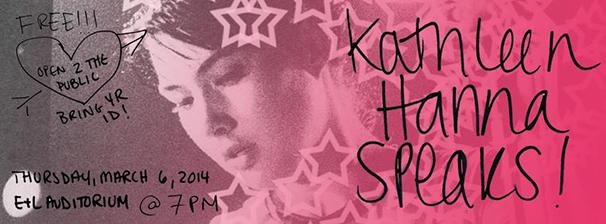
Musician and feminist activist Kathleen Hanna held a lecture at the Kimmel Center for University Life on March 6, attracting a large group of students that filled the room to capacity. Hanna is best known for being a member of the punk band Bikini Kill and an important figure in the riot grrrl movement. Recently, her ventures include being a part of the multimedia electronic group Le Tigre and her current band, the Julie Ruin.
In her lecture, Hanna spoke about the importance of language in feminism and its role in female empowerment. She said by the end of the riot grrrl movement in 1996, the language of feminism had undergone a change.
“I felt the language we had made to empower ourselves, for lack of a better phrase or word, was just stolen and cheapened and didn’t mean anything,” Hanna said. “I felt like I had kind of lost language.”
Hanna discussed how girl power has been appropriated by teen magazines that feature nearly naked female pop stars. Hanna said this loss of language is almost irrelevant because artists such as herself are constantly creating new language to voice their ideas, which she does with her musical projects.
Hanna also spoke about her work at the Willie Mae Rock Camp for girls, where she mentors young aspiring female musicians. She explained that this work fulfills the riot grrrl goal of involving younger women in bands and the music world. Although the original riot grrrl movement ended, Hanna continues to voice her strength through her work in musical projects and the mentoring of young female artists.
During the question-and-answer session, students asked Hanna about applying feminism in everyday situations, especially when faced with the sexism and misogyny prevalent in today’s society. As a response, Hanna discussed how people can find ways to incorporate feminism into what they love to do, as she did with music. She half-jokingly said if someone really loved gardening, they could find a way to combine feminism with gardening. Hanna’s point was that feminism can exist in many ways, not being constricted to a movement, medium or time period.
Gallatin senior and Program Board co-chair Sara Intrator introduced Hanna, describing the activist as one of her personal heroes.
“I’ve seen her speak before, and every one of her projects can be a savior for these people,” Intrator said.
Intrator was evidently not alone in her opinion, with many people lining up after the lecture to talk and take photos with Hanna.
Tisch junior Kevin Patterson said Hanna’s lecture was impressive.
“A lot of the topics [Hanna discussed] are still ignored in mainstream examinations of gender roles,” Patterson said. “It was [also] great to see the subjects and background on a lot of the art she makes.”
A version of this article appeared in the Monday, March 10 print edition. Sam Del Rowe is a staff writer. Email him at [email protected].
























































































































































